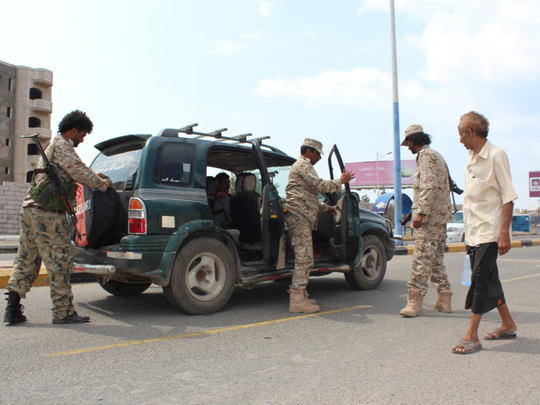
Al Mukalla: Yemen government army troops and resistance fighters are slowly advancing to the capital Sana’a almost a year after Iran-backed Al Houthis militants stormed a presidential palace and imposed house on the internationally-recognised president Abd Rabbo Mansour Hadi.
On Monday, a spokesperson for Sana’a Resistance, a gathering of tribesmen and other figures who were forced to leave the capital after Al Houthis’ capture of the capital, told Gulf News that pro-government fighters have taken control of new regions in Nehim district in the Sana’a province after fierce battles with the militants.
“In the last couple of days we have recaptured of all hills and mountains that overlook Al Amer village and imposed a siege on Al Zaher and Barkesh areas,” Abdullah Al Shandagi said.
The advances come as Yemen’s prime minister and his Cabinet returned on Monday to the southern port city of Aden, months after he was targeted in a suicide bombing that forced them to leave the country.
Bahah’s return is aimed at establishing a permanent government presence in Aden, officials in his office said.
Early last month, government troops backed by warplanes from a Saudi-led Arab coalition mounted an attack on Sana’a province where hundreds of highly-trained troops cleared the militants from many areas in Marib province before raiding some army camps and places controlled by the rebels.
Al Shandagi said that at least 150 Al Houthis fighters have been captured since the beginning of the assault.
Some of them surrendered before fighting.
“The resistance’s stiff and aggressive attacks on their positions have caused a loss of morale within Al Houthis.”
Al Houthis militants have also suffered heavy setbacks in many battlefields in recent months.
In the northern province of Hajja, army troops have choked Al Houthi supply routes arms after recapturing the strategic seaport on Midi on the Red Sea and moved to controlling Haradh city in border with Saudi Arabia.
Pro-government forces have also scored many territorial gains in Jawf province where the militants lost control over Hazm, the capital and many main districts.
“Government forces are taking the offensive in the fighting,” Sami Noaman, an independent political analyst told Gulf News.
“Government troops are advancing on many fronts in Marib, Jawf, Hajja and Taiz. Al Houthis and their allied forces are in defensive positions,”
The prospect for a new round of peace talks between the government and the Iran-backed militants seems bleak as Al Houthis refuse to make the necessary concessions requested by the Yemeni government. It was a release of all prisoners and to ease its siege and indiscriminate shelling of Taiz.
Last month, ousted Yemeni president Ali Abdullah Saleh, who has teamed up Al Houthis which were his former enemy, said his party would not take part in any peace talks.
Instead, he called for direct talks with Riyadh.
On their part and despite suffering heavy losses, Al Houthis stubbornly say they will keep fighting.
Yemen’s government has said that the UN Special Envoy for Yemen Esmail Ould Shaikh Ahmad has returned empty handed from the Yemen capital after failing to convince Saleh and Al Houthis to offer concessions before heading to further peace talks.
On Sunday, Yemen foreign minister Abdul Malik Al Mekhlafi, deputy prime minister and foreign minister , said in the Bahraini capital Manama that his government is still holding out an olive branch, accusing Al Houthis of escalating hostilities and not respecting the outcome of a second round of peace talks that ended in Geneva last month.
“I think that peace talks have reached a deadlock due to big differences between both sides,” Noaman said.
“The government insists on accepting UN Security Council Resolution and wants some to see some trust-building steps like releasing prisoners and lifting the siege on Taiz. The Al Houthi-Saleh alliance seek halt to coalition air strikes,”
Meanwhile, Al Houthi leader Abdul Malik Al Houthi has been conspicuously out of the public eye since December when he was celebrating Prophet Mohammad’s (PBUH) birthday.
Due to security fears, he opted to go in hiding,” Noaman said. His disappearance has sparked many rumours about his fate.
Meanwhile, the humanitarian crisis in Yemen continues unabated. At least 5,000 Yemenis have died according to UN figures, while millions are in need of urgent humanitarian relief.
Taiz, Yemen’s third largest city, has bore the brunt of Al Houthi’s brutal aggression.
Local human rights organisations that document civilians casualties say that the siege and shelling have killed hundreds of people and endangered the lives of thousands of civilians, including women and children. Medics say that hospitals are suffering from a shortage of oxygen and vital drugs. To avoid Al Houthi-manned checkpoints, residents are forced to climb dangerously steep mountain roads to get in basic supplies.












